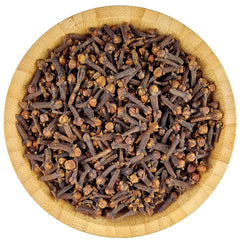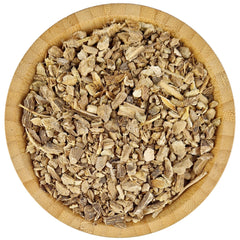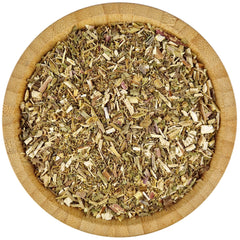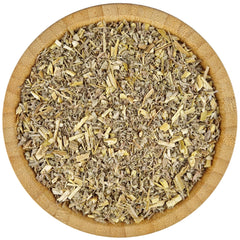Parasites
Gastrointestinal parasites enter the body through food as a result of insufficient hand hygiene, eating unwashed fruit and vegetables, or raw meat (e.g. tartare or sushi) that has been infected. The parasites that most often attack the human digestive system are tapeworms, roundworms, pinworms, barnacles, intestinal nematodes and Giardia. Parasitic infections are diagnosed using laboratory tests, but due to the possibility of misleading results, it is worth paying special attention to symptoms such as abdominal pain and headaches, nausea, vomiting, diarrhea, weakness, weight loss, irritability, insomnia, skin changes and anemia.
Cloves
Dried cloves are the aromatic flower buds of the clove tree, which are harvested when they are still unopened and dried in the sun. They are commonly used in cooking...
Elecampane Root
Elecampane (Inula helenium rhizoma concisus) is a plant native to Central Asia. It has been known for a very long time, it is one of the earliest known plants with...
Tansy Herb
Tansy herb has a long history of medicinal use dating back to ancient times. It has been used to treat a variety of ailments, including digestive disorders, menstrual cramps, fever,...
Wormwood Herb
Wormwood – the all-natural wonder herb that has been used for centuries for its numerous health benefits. Known for its bitter taste and distinctive aroma, Wormwood has been used in...
Filtres
- Tout
- Œil-de-cheval
- Absinth
- Absinthe
- Absinthe Suisse
- Absinthii Herba
- Absinthites
- Absinthium
- Afsantin
- Ajenjo
- Alant
- Alvine
- Armoise
- Armoise Absinthe
- Armoise Amère
- Armoise Commune
- Armoise Vulgaire
- Artemisia absinthium
- Artesian Absinthium
- Aster helenium
- Aster officinalis
- Aunée
- Aunée Officinale
- Barbotine
- Bitter Buttons
- Black
- Bourgeon Floral de Clou de Girofle
- Bouton Floral de Clou de Girofle
- Buttons
- Caryophylli Flos
- Caryophyllum
- Caryophyllus aromaticus
- Chrysanthemi Vulgaris Flos
- Chrysanthemi Vulgaris Herba
- Chrysanthemum vulgare
- Clavo de Olor
- Clous de Girolfe
- clove
- Clove Flower
- Clove Flowerbud
- Clove Leaf
- Clove Oil
- Clove Stem
- cloves
- Cloves Bud
- cloves whole
- Common Wormwood
- Coq des Jardins
- Daisy
- Ding Xiang
- Elfdock
- Elfwort
- Enule Campagne
- Erva dos Vermes
- Eugenia aromatica
- Eugenia caryophyllata
- Eugenia caryophyllus
- Feuille de Clou de Girofle
- Fleur de Clou de Girofle
- Flores Caryophylli
- Flores Caryophyllum
- Gewurznelken Nagelein
- Girofle
- Giroflier
- Grande Absinthe
- Grande Aunée
- Green Fairy
- Green Ginger
- Helenio
- Helenium grandiflorum
- Herba Artemisae
- Herbal tea
- Herbe Am ère
- Herbe au Coq
- Herbe aux Vers
- Herbe d'Absinthe
- Herbe de Chartreux
- Herbe de Saint-Marc
- Herbe de Sainte-Marie
- Herbe du Bon Chasseur
- Herbe Sainte
- Hind Heal
- Horse-Elder
- Horseheal
- Huile de Clou de Girofle
- Indhana
- Indian Elecampane
- Inula
- Inula helenium
- Inule Aulnée
- Inule Aunée
- Inule Hélénie
- Kreteks
- Lapsent
- Lavang
- Lavanga
- Madderwort
- Menu Alvine
- Oil of Clove
- Parsley Fern
- Qing Hao
- Scabwort
- Scented Fern
- Sent-Bon
- Spice
- Stinking Willie
- Syzygium aromaticum
- Tanaceto
- Tanacetum boreale
- Tanacetum vulgare
- Tanaisie
- Tanaisie Commune
- Tanaisie Vulgaire
- Tansy
- Tansy Flower
- Tansy Herb
- Tansy Herb Cut
- Tige de Clou de Girofle
- Velvet Dock
- Vilayati Afsanteen
- Wermut
- Wermutkraut
- Western Wormwood
- whole cloves
- Wild Sunflower
- Wurmkraut
- Yellow Starwort







